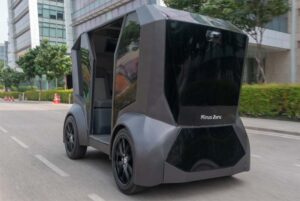Bengaluru-based start-up Minus Zero has claimed to introduce India’s first autonomous vehicle based on a camera-sensor suite.
 The autonomous vehicle does not have a steering wheel and relies on camera-based sensors instead of the usual LiDAR and radar tech.
The autonomous vehicle does not have a steering wheel and relies on camera-based sensors instead of the usual LiDAR and radar tech.
The start-up claims the vehicle can be equipped with Level 5 autonomy capabilities, which will allow it to drive itself in all environmental and geographical constraints.
The AI capabilities were demonstrated in specially curated experience zones along with True Vision Autonomy (TVA) driving the concept vehicle zPod autonomously across the sprawling venue.
Minus Zero was founded in 2021 by Gagandeep Reehal and Gursimran Kalra, to enable safe and scalable autonomous driving via their proprietary approach to AI.
It also released a whitepaper on its approach, dubbed ‘Nature-Inspired AI’ (NIA), which will build on generalized autonomous agents inspired by the physics-aware vision and the predictive decision-making capabilities of a human brain.
This it says makes it efficient in handling real-world road scenarios, unlike traditional AI. The whitepaper, available for public viewing, shares the guiding principles for the safe and scalable adoption of truly AI-driven mobility.
At present, the autonomous vehicle industry is eclipsed by three challenges – expensive hardware, the requirement of extensive data, and navigation through complex traffic conditions and unruly infrastructure.
The start-up claims that the traditional robotics paradigm currently being used to build AI is prone to failure when facing scenarios, it hasn’t been trained on.
With the sky-high costs related to sophisticated on-vehicle hardware and data acquisition for AI training, these algorithms are inherently far from being deployment ready for real-world conditions.
Minus Zero says its proprietary nature-inspired algorithm tackles the three barriers between existing AI systems and human brain capabilities – real-time low-power processing, adaptability to uncertain or chaotic real-road conditions, and the elimination of the need to re-learn driving for different use cases, geographies, or vehicles.
Using NIA, the start-up has introduced the concept of ‘True Vision Autonomy’ (TVA), which it believes is the safest and most scalable approach to autonomous driving, and can scale up to L5 autonomy.
TVA is vehicle agnostic and relies only on cameras as its sensor suite. Its capabilities were demonstrated by the company on z-Day in the concept vehicle called “zPod.”
Gagandeep Reehal, CEO and Co-Founder, Minus Zero said, “Due to the lack of safe autonomous vehicle solutions, many lives are lost each year, and economies lose several billion dollars. With true vision autonomy coming to the fore, one can make autonomous vehicles a reality, solving major pain points of the mobility paradigm.”
Gursimran Kalra, Co-Founder, Minus Zero said, “Our concepts are a new revolution in the automotive industry. They allow automakers to explore new design possibilities for vehicles, currently limited by the constraints of a driver-led design. We aim to redefine mobility from a driver-centric hassle to a user-focused experiential design.”
Minus Zero has identified near-term use cases through multiple trials and proof-of-concept for in-campus mobility and advanced driver-assistance systems (ADAS).
It aims to expand trials to foreign markets with stable regulatory norms over the next two years, including public road trials.
